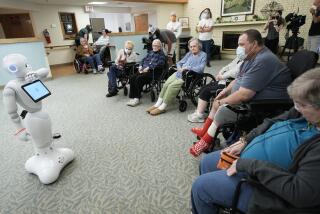The disabled may be hurt most by Paul Ryan’s Medicare plan
Amid all the chatter about whether Paul D. Ryan’s proposed changes would, as Democrats say, “end Medicare as we know it,” one group has been largely overlooked: disabled people.
The vast majority of Medicare’s roughly 48 million beneficiaries are seniors over the age of 65. But about 8 million are disabled people of all ages. The federal program was expanded in 1972 to include those with permanent disabilities.
Many seniors are rightly concerned that Ryan, the conservative congressman tapped by Mitt Romney as his vice presidential running mate, has proposed a plan that could result in higher out-of-pocket expenses for Medicare coverage.
But disabled people could be in for an even bigger shock.
“People with disabilities are among the most vulnerable of the Medicare population,” said Tricia Neuman, senior vice president of the nonprofit, nonpartisan Kaiser Family Foundation. “They have chronic conditions that require ongoing care, and, in many cases, they have relatively low incomes.”
In other words, Ryan’s plan could entail higher healthcare costs for people in the worst position to deal with them.
A quick refresher: I wrote last week about how the Ryan plan would affect Medicare and Medicaid. People under 55 would receive a federal subsidy — a voucher — to buy health insurance once they reach the eligibility age, which Ryan would raise to 67.
That voucher would be used to buy either conventional Medicare coverage or a similar plan from, say, one of half a dozen private insurers.
The amount of the voucher would be determined by the cost of the second-least-expensive plan available, which experts say would likely be private coverage that would not be as comprehensive as Medicare.
People who select a plan that’s cheaper than the subsidy would be free to pocket the difference. Those who prefer coverage that’s pricier than the subsidy — Medicare, for example — would have to pay the additional cost themselves.
The upshot, critics say, is that Ryan’s plan would result in a greater share of Medicare’s costs shifting to the elderly and the disabled.
Spencer Shiffman has been on Medicare since he was diagnosed with testicular cancer at the age of 24. The Calabasas resident beat it — and overcame a recurrence four years later.
Then at age 33 came an even more punishing blow: a diagnosis of peritoneal mesothelioma, a particularly aggressive form of cancer that the National Institutes of Health describes as “a universally fatal disease” that typically kills within one year.
“Without Medicare, I’d have been dead years ago,” Shiffman, now 51, told me.
He credited the government program with covering the various forms of treatment — chemotherapy, surgery, blood transfusions — that have allowed him to beat the odds and live a relatively normal life, despite his ongoing designation as a terminal cancer patient.
So what would happen to Shiffman under Ryan’s overhaul of Medicare? Like other beneficiaries, he’d receive his annual subsidy from the federal government. Unlike many others, he wouldn’t have much choice in coverage.
“I see a number of different specialists and will have to monitor my condition for the rest of my life,” Shiffman said. “So I’d probably have to stick with Medicare, whatever the cost,” because it would provide the most coverage.
That cost would almost certainly be higher for Shiffman and others in his position, said David Lipschutz, policy attorney with the nonprofit Center for Medicare Advocacy.
A big concern, he said, is private insurers trying to woo healthier people with lower-priced plans that offer less coverage than Medicare.
“Medicare would retain the folks who are sicker and cost more,” Lipschutz said. “That would drive up the cost of the program.”
He also warned of significant consequences for so-called dual-eligibles — people who qualify for both Medicare and Medicaid because of age or condition as well as income level.
According to some estimates, the Ryan plan would cut Medicaid federal spending for low-income people by about a third over the first decade. Healthcare analysts expect many people to be dropped from the program as funding dwindles.
Joel Rosenberg, 72, is a dual-eligible. He told me Medicare covers much of the cost of treating the prostate cancer he was diagnosed with in 2010, but Medi-Cal — as Medicaid is known in California — is essential for lowering the costs of his prescription drugs.
To help cover his medical costs, Rosenberg has had to take out a reverse mortgage on his Highland Park house. One day, ownership of the property will revert to the bank.
“I have no other income,” Rosenberg said. “If I lost Medi-Cal, it would be very difficult. Very difficult.”
What’s the solution? I suggested it last week, but I’ll make it more explicit here: Medicare for all.
Rather than increasing the role of mostly for-profit companies in healthcare, a more economically rational and socially equitable approach would be to spread medical risk throughout society via a national insurance plan.
Most other developed countries have adopted such a system for the simple reason that it works. Not perfectly, perhaps. But better than our approach, which has resulted in about 50 million people being uninsured and higher spending per person on medical treatment.
People like Shiffman and Rosenberg aren’t cheap. Shiffman estimates that the cost of his treatment over the years tops $1 million.
The question is: Do we live in the sort of country that turns its back on people in need? Or do we live in the sort of country that rises to the challenge of giving everyone a fair chance at a healthy life?
“Government-run healthcare doesn’t work,” Ryan said last year. “Wherever we’ve seen government-run healthcare, it’s failed.”
He’s wrong about that, as the facts plainly show. And he’s wrong about any reform of our healthcare system that makes things tougher for the very people we need to help most.
David Lazarus’ column runs Tuesdays and Fridays. He also can be seen daily on KTLA-TV Channel 5 and followed on Twitter @LATlazarus. Send tips or feedback to david.lazarus@latimes.com.







